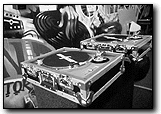![[ ARTS
]](/images/fall97/artsublogo.gif)
Arizona Summer Wildcat June 17, 1998
The delicate sound of vinyl
![[Picture]](12_1_i.gif)
|
Bryon Wells
Local DJ Alex Ruiz spins records at his owned and operated Sound Factory, a small record shop on East Grant Road that refuses to let vinyl die. Ruiz and the Sound Factory have come a long way since he opened the shop about a year ago. He now spins records at several local clubs and on the air with an after-hours techno music radio show on 98.3 FM. He also has his own record coming out in July.
|
Arizona Summer Wildcat
A small store, covered with spray-can art and crammed between a tattoo parlor and an upholstery shop on East Grant Road, refuses to let vinyl records die.
But these aren't your daddy's records.
Alex Ruiz and his shop, the Sound Factory, 2717 E. Grant Road, cater to a clientele who are wired into techno, an adrenaline-fueled type of electronic music played by one person armed only with two turntables, a sound mixer and a crate of records.
"You can do a lot more with vinyl," said Ruiz, who owns the store and spins records at local clubs and rave parties. "Vinyl is sitting right under your hand. You can do whatever you want. You're in control."
The staccato rhythm of rising and falling electronic beats is a familiar sound as you step through the doors of the Sound Factory. The walls are splashed with graffiti-style murals which surround the bins in the center of the floor, stacked with hip-hop, house and various types of techno records.
Ruiz said most of the people coming into the shop know what they want.
However, Ruiz, being a DJ himself, can decipher the code of electronic drum riffs and bass lines for somebody who has just gotten into the music and doesn't know the difference between trance, hardcore or breakbeat - all different styles of music that have evolved into individual branches of the techno family tree.
"There's tons of styles," Ruiz said, sifting through a stack of 12-inch records that came in with an afternoon shipment.
"Some kids might come in and say, 'Hey, my roommate told me house is pretty cool, what is it?' So we say, 'Look, it sounds like this. A good example of a record is this, and DJ this plays that and DJ that plays that,' so the kid knows, gets a feel, of which party to attend, or what promoters throw that type of music."

Bryon Wells / Arizona Summer Wildcat
Two turntables and a crate of records are all a DJ needs to keep a rave or club bouncing into the early hours. Ruiz says vinyl records are still the preference of most hip-hop and rave DJs because of the easy, hands-on manipulation of the records compared to compact disc players.
Ruiz then threw a record on one of the turntables and a sound resembling a sped-up drum machine broken up by a pattern of shorter percussion filled the store as he turned up the volume, demonstrating a style of music he said he often plays.
"You know how a beat goes 'boom-boom-boom?' Breakbeat goes 'boom-da-da-boom- boom,'" Ruiz said, then paused to let the sound of the music define itself.
"See how it breaks the beat?"
"It's like a solid beat, it just doesn't have bass every beat. So, it (like a drum or snare) breaks it up every beat," said Jaime Schuman, a Sound Factory worker and an atmospheric sciences junior at the University of Arizona.
Schuman said he became involved in the techno music scene when he was about 21 years old, and was happy to go work for Ruiz, already a friend, when he opened up the Sound Factory more than a year ago.
Ruiz, 22, said he initially became interested in acid house music-underground electronic dance music reputedly born in Chicago - when he was 16 and living in Los Angeles.
"Most of these new kids, they're attracted to the scene by drugs, or because it's a big trend, you know, like everybody wants to wear baggy pants or wear colors," Ruiz said. "That didn't bring me to the scene. It was like, after-hours events were a party to get away from everybody. It was different, you know?"
Ruiz eventually moved to Yuma, and then to Tucson, where he began spinning records.
"I just started doing it for fun, then started working into clubs, then parties, and then - Boom! You know?" Ruiz said. "Suddenly you start playing all these parties, and then, you start getting recognition in town and you get recognition out of state."
Ruiz said he believes that techno and house music are now forcing themselves into mainstream society and the scene has progressed since the parties were called "undergrounds" and illegally held in abandoned buildings.
Selling tickets for raves and other club events, such as a recent LL Cool J show, allows people who have never experienced the techno music and culture to see what it's all about.
"Sometimes we'll sell 300 tickets, 400 tickets. Even 100 tickets, that's a hundred people walking through your store," he said.
Sound Factory will sell tickets for the June 19 DJ Doc Martin show at the Rialto Theatre, 318 E. Congress St.
Ruiz also DJs Tuesday nights at The New West, 4385 W. Ina Road, and plays from 2 - 3 a.m. on an after-hours radio show Saturday nights on 98.3 FM.
"I think all the rave kids are just tuned into it," Ruiz said.
"That's the reason why I took the radio show. That's the reason why I go out and do clubs, because if people see that it's in their face, all the time, under fire, eventually people are going have to just accept it and it's going to explode here just like it exploded anywhere else," he added.
"So, it's like, Tucson is ready."



